Exploring Cultural Identity: A Reflective Essay Example
VerifiedAdded on 2023/01/12
|5
|1320
|65
Essay
AI Summary
This essay provides a reflective account of the author's cultural identity, primarily focusing on their experiences within British culture. The essay explores the influence of family, community, and societal norms on the author's sense of belonging. It delves into key aspects of British culture such as punctuality, linguistic politeness, and multiculturalism, highlighting how these elements have shaped the author's behavior and interactions. The essay also examines the impact of migration and cultural diversity on the author's identity, including the challenges and benefits of intersectionality and the application of Hofstede's cultural dimensions. Through personal anecdotes and references to academic literature, the essay offers a comprehensive analysis of cultural identity formation and the complexities of navigating different cultural perspectives. The conclusion summarizes the importance of understanding cultural differences for fostering a more inclusive society.
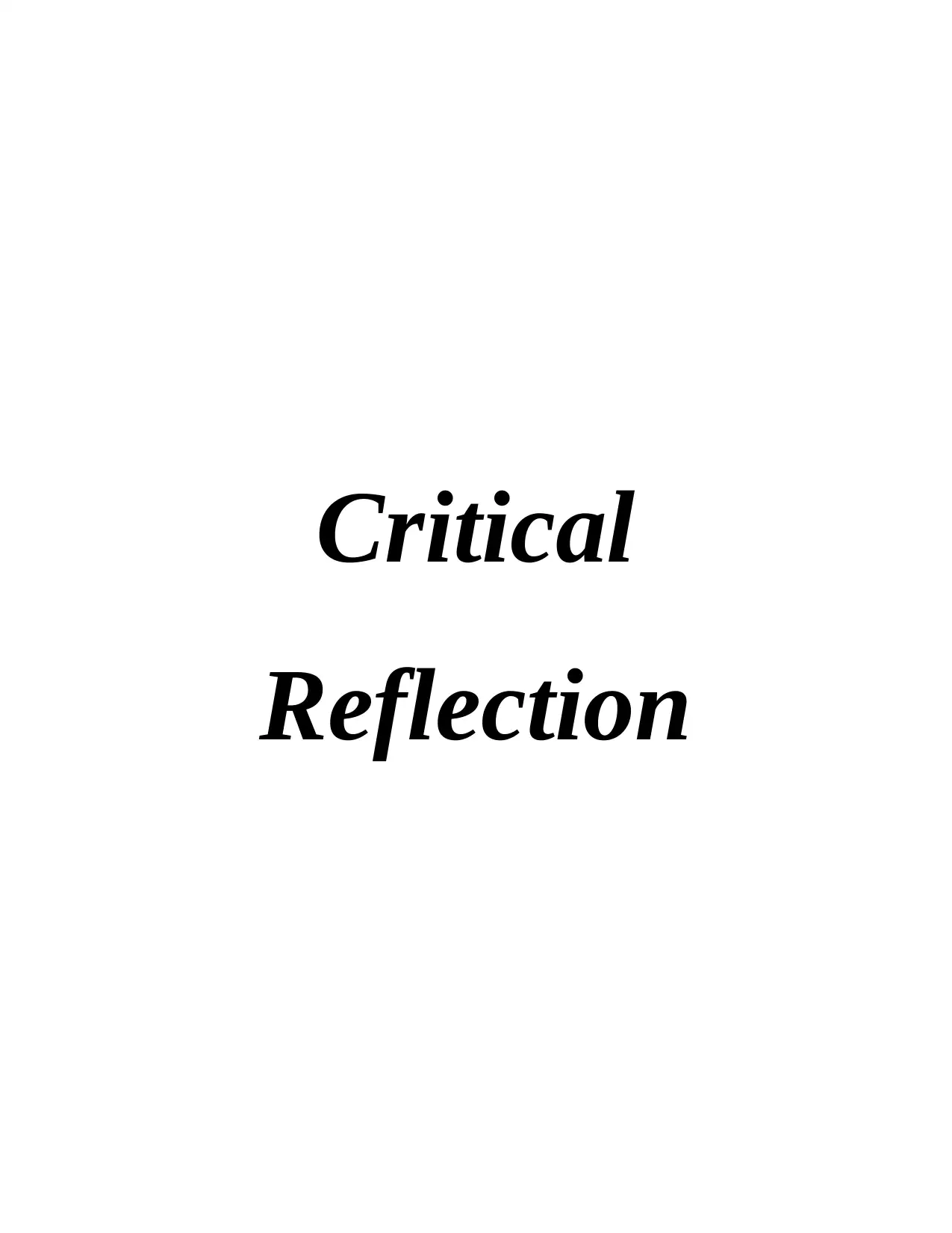
Critical
Reflection
Reflection
Paraphrase This Document
Need a fresh take? Get an instant paraphrase of this document with our AI Paraphraser
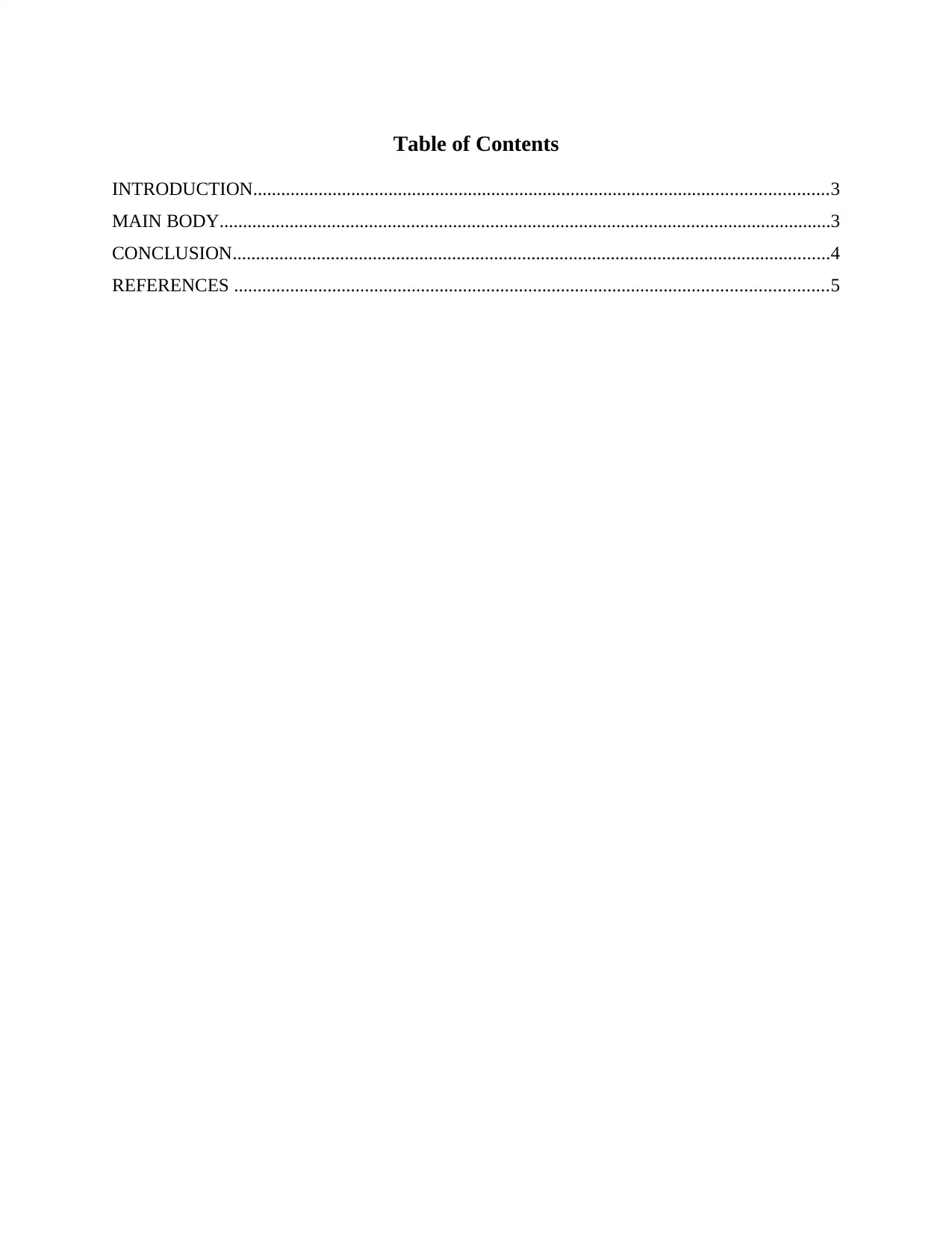
Table of Contents
INTRODUCTION...........................................................................................................................3
MAIN BODY...................................................................................................................................3
CONCLUSION................................................................................................................................4
REFERENCES ...............................................................................................................................5
INTRODUCTION...........................................................................................................................3
MAIN BODY...................................................................................................................................3
CONCLUSION................................................................................................................................4
REFERENCES ...............................................................................................................................5
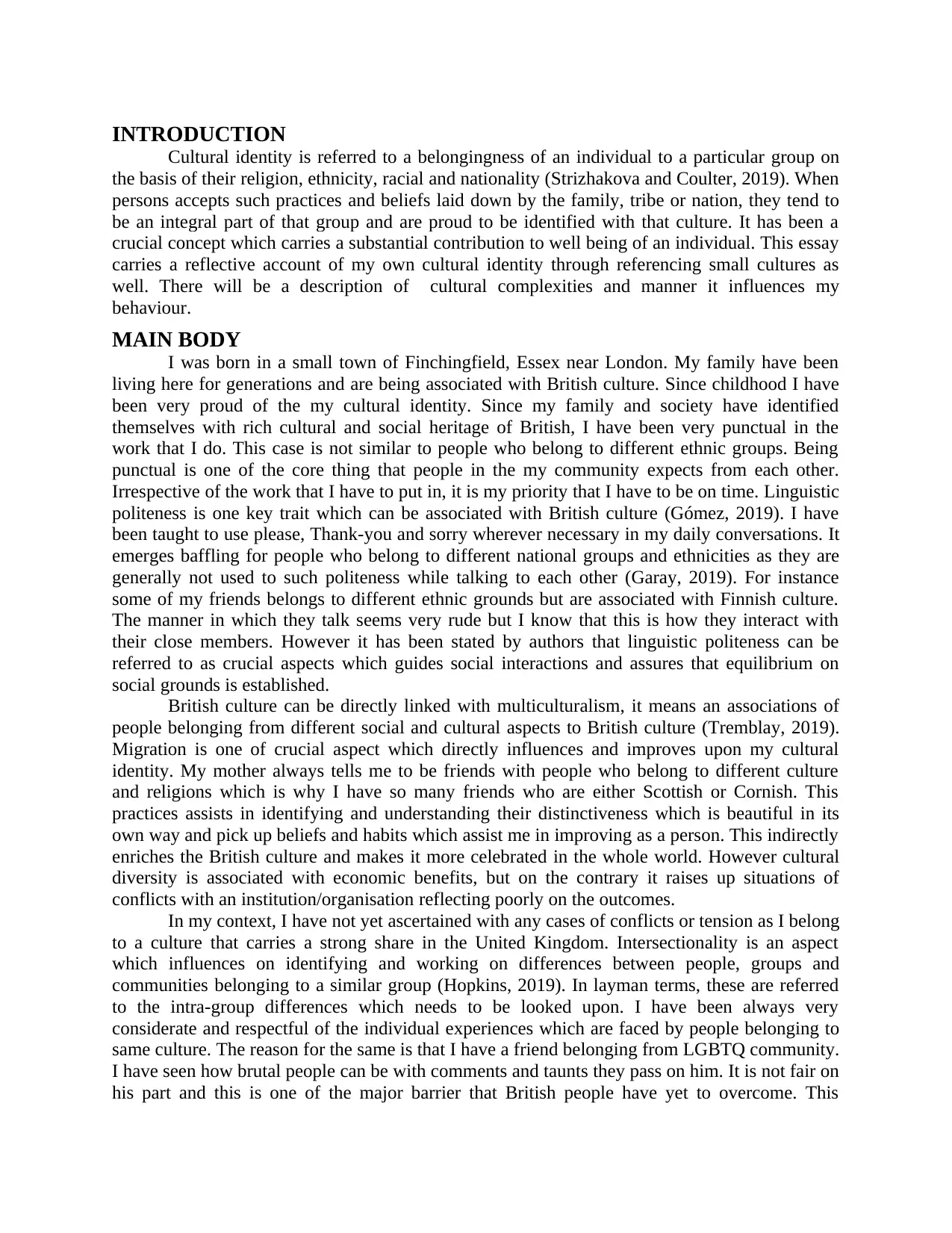
INTRODUCTION
Cultural identity is referred to a belongingness of an individual to a particular group on
the basis of their religion, ethnicity, racial and nationality (Strizhakova and Coulter, 2019). When
persons accepts such practices and beliefs laid down by the family, tribe or nation, they tend to
be an integral part of that group and are proud to be identified with that culture. It has been a
crucial concept which carries a substantial contribution to well being of an individual. This essay
carries a reflective account of my own cultural identity through referencing small cultures as
well. There will be a description of cultural complexities and manner it influences my
behaviour.
MAIN BODY
I was born in a small town of Finchingfield, Essex near London. My family have been
living here for generations and are being associated with British culture. Since childhood I have
been very proud of the my cultural identity. Since my family and society have identified
themselves with rich cultural and social heritage of British, I have been very punctual in the
work that I do. This case is not similar to people who belong to different ethnic groups. Being
punctual is one of the core thing that people in the my community expects from each other.
Irrespective of the work that I have to put in, it is my priority that I have to be on time. Linguistic
politeness is one key trait which can be associated with British culture (Gómez, 2019). I have
been taught to use please, Thank-you and sorry wherever necessary in my daily conversations. It
emerges baffling for people who belong to different national groups and ethnicities as they are
generally not used to such politeness while talking to each other (Garay, 2019). For instance
some of my friends belongs to different ethnic grounds but are associated with Finnish culture.
The manner in which they talk seems very rude but I know that this is how they interact with
their close members. However it has been stated by authors that linguistic politeness can be
referred to as crucial aspects which guides social interactions and assures that equilibrium on
social grounds is established.
British culture can be directly linked with multiculturalism, it means an associations of
people belonging from different social and cultural aspects to British culture (Tremblay, 2019).
Migration is one of crucial aspect which directly influences and improves upon my cultural
identity. My mother always tells me to be friends with people who belong to different culture
and religions which is why I have so many friends who are either Scottish or Cornish. This
practices assists in identifying and understanding their distinctiveness which is beautiful in its
own way and pick up beliefs and habits which assist me in improving as a person. This indirectly
enriches the British culture and makes it more celebrated in the whole world. However cultural
diversity is associated with economic benefits, but on the contrary it raises up situations of
conflicts with an institution/organisation reflecting poorly on the outcomes.
In my context, I have not yet ascertained with any cases of conflicts or tension as I belong
to a culture that carries a strong share in the United Kingdom. Intersectionality is an aspect
which influences on identifying and working on differences between people, groups and
communities belonging to a similar group (Hopkins, 2019). In layman terms, these are referred
to the intra-group differences which needs to be looked upon. I have been always very
considerate and respectful of the individual experiences which are faced by people belonging to
same culture. The reason for the same is that I have a friend belonging from LGBTQ community.
I have seen how brutal people can be with comments and taunts they pass on him. It is not fair on
his part and this is one of the major barrier that British people have yet to overcome. This
Cultural identity is referred to a belongingness of an individual to a particular group on
the basis of their religion, ethnicity, racial and nationality (Strizhakova and Coulter, 2019). When
persons accepts such practices and beliefs laid down by the family, tribe or nation, they tend to
be an integral part of that group and are proud to be identified with that culture. It has been a
crucial concept which carries a substantial contribution to well being of an individual. This essay
carries a reflective account of my own cultural identity through referencing small cultures as
well. There will be a description of cultural complexities and manner it influences my
behaviour.
MAIN BODY
I was born in a small town of Finchingfield, Essex near London. My family have been
living here for generations and are being associated with British culture. Since childhood I have
been very proud of the my cultural identity. Since my family and society have identified
themselves with rich cultural and social heritage of British, I have been very punctual in the
work that I do. This case is not similar to people who belong to different ethnic groups. Being
punctual is one of the core thing that people in the my community expects from each other.
Irrespective of the work that I have to put in, it is my priority that I have to be on time. Linguistic
politeness is one key trait which can be associated with British culture (Gómez, 2019). I have
been taught to use please, Thank-you and sorry wherever necessary in my daily conversations. It
emerges baffling for people who belong to different national groups and ethnicities as they are
generally not used to such politeness while talking to each other (Garay, 2019). For instance
some of my friends belongs to different ethnic grounds but are associated with Finnish culture.
The manner in which they talk seems very rude but I know that this is how they interact with
their close members. However it has been stated by authors that linguistic politeness can be
referred to as crucial aspects which guides social interactions and assures that equilibrium on
social grounds is established.
British culture can be directly linked with multiculturalism, it means an associations of
people belonging from different social and cultural aspects to British culture (Tremblay, 2019).
Migration is one of crucial aspect which directly influences and improves upon my cultural
identity. My mother always tells me to be friends with people who belong to different culture
and religions which is why I have so many friends who are either Scottish or Cornish. This
practices assists in identifying and understanding their distinctiveness which is beautiful in its
own way and pick up beliefs and habits which assist me in improving as a person. This indirectly
enriches the British culture and makes it more celebrated in the whole world. However cultural
diversity is associated with economic benefits, but on the contrary it raises up situations of
conflicts with an institution/organisation reflecting poorly on the outcomes.
In my context, I have not yet ascertained with any cases of conflicts or tension as I belong
to a culture that carries a strong share in the United Kingdom. Intersectionality is an aspect
which influences on identifying and working on differences between people, groups and
communities belonging to a similar group (Hopkins, 2019). In layman terms, these are referred
to the intra-group differences which needs to be looked upon. I have been always very
considerate and respectful of the individual experiences which are faced by people belonging to
same culture. The reason for the same is that I have a friend belonging from LGBTQ community.
I have seen how brutal people can be with comments and taunts they pass on him. It is not fair on
his part and this is one of the major barrier that British people have yet to overcome. This
⊘ This is a preview!⊘
Do you want full access?
Subscribe today to unlock all pages.

Trusted by 1+ million students worldwide
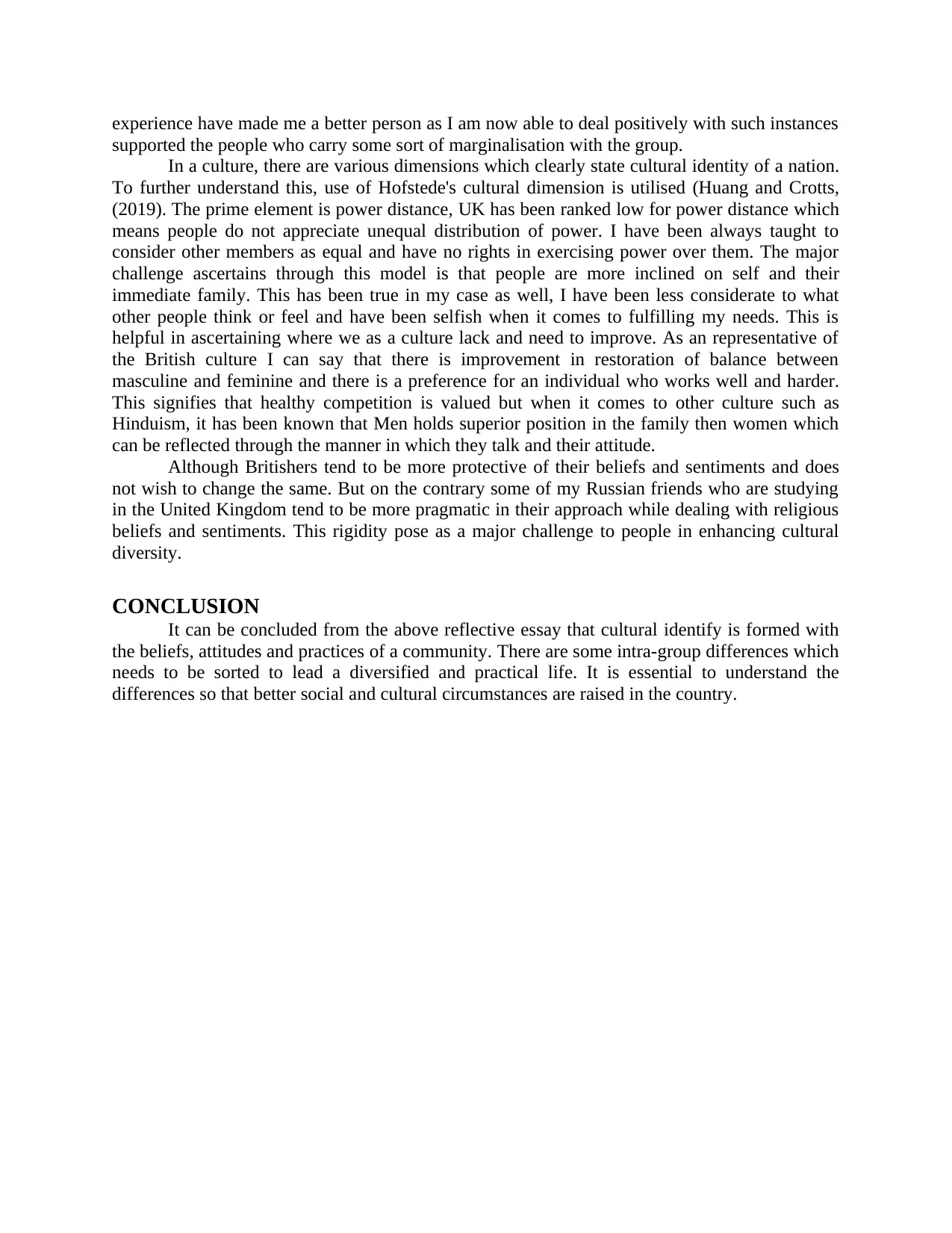
experience have made me a better person as I am now able to deal positively with such instances
supported the people who carry some sort of marginalisation with the group.
In a culture, there are various dimensions which clearly state cultural identity of a nation.
To further understand this, use of Hofstede's cultural dimension is utilised (Huang and Crotts,
(2019). The prime element is power distance, UK has been ranked low for power distance which
means people do not appreciate unequal distribution of power. I have been always taught to
consider other members as equal and have no rights in exercising power over them. The major
challenge ascertains through this model is that people are more inclined on self and their
immediate family. This has been true in my case as well, I have been less considerate to what
other people think or feel and have been selfish when it comes to fulfilling my needs. This is
helpful in ascertaining where we as a culture lack and need to improve. As an representative of
the British culture I can say that there is improvement in restoration of balance between
masculine and feminine and there is a preference for an individual who works well and harder.
This signifies that healthy competition is valued but when it comes to other culture such as
Hinduism, it has been known that Men holds superior position in the family then women which
can be reflected through the manner in which they talk and their attitude.
Although Britishers tend to be more protective of their beliefs and sentiments and does
not wish to change the same. But on the contrary some of my Russian friends who are studying
in the United Kingdom tend to be more pragmatic in their approach while dealing with religious
beliefs and sentiments. This rigidity pose as a major challenge to people in enhancing cultural
diversity.
CONCLUSION
It can be concluded from the above reflective essay that cultural identify is formed with
the beliefs, attitudes and practices of a community. There are some intra-group differences which
needs to be sorted to lead a diversified and practical life. It is essential to understand the
differences so that better social and cultural circumstances are raised in the country.
supported the people who carry some sort of marginalisation with the group.
In a culture, there are various dimensions which clearly state cultural identity of a nation.
To further understand this, use of Hofstede's cultural dimension is utilised (Huang and Crotts,
(2019). The prime element is power distance, UK has been ranked low for power distance which
means people do not appreciate unequal distribution of power. I have been always taught to
consider other members as equal and have no rights in exercising power over them. The major
challenge ascertains through this model is that people are more inclined on self and their
immediate family. This has been true in my case as well, I have been less considerate to what
other people think or feel and have been selfish when it comes to fulfilling my needs. This is
helpful in ascertaining where we as a culture lack and need to improve. As an representative of
the British culture I can say that there is improvement in restoration of balance between
masculine and feminine and there is a preference for an individual who works well and harder.
This signifies that healthy competition is valued but when it comes to other culture such as
Hinduism, it has been known that Men holds superior position in the family then women which
can be reflected through the manner in which they talk and their attitude.
Although Britishers tend to be more protective of their beliefs and sentiments and does
not wish to change the same. But on the contrary some of my Russian friends who are studying
in the United Kingdom tend to be more pragmatic in their approach while dealing with religious
beliefs and sentiments. This rigidity pose as a major challenge to people in enhancing cultural
diversity.
CONCLUSION
It can be concluded from the above reflective essay that cultural identify is formed with
the beliefs, attitudes and practices of a community. There are some intra-group differences which
needs to be sorted to lead a diversified and practical life. It is essential to understand the
differences so that better social and cultural circumstances are raised in the country.
Paraphrase This Document
Need a fresh take? Get an instant paraphrase of this document with our AI Paraphraser
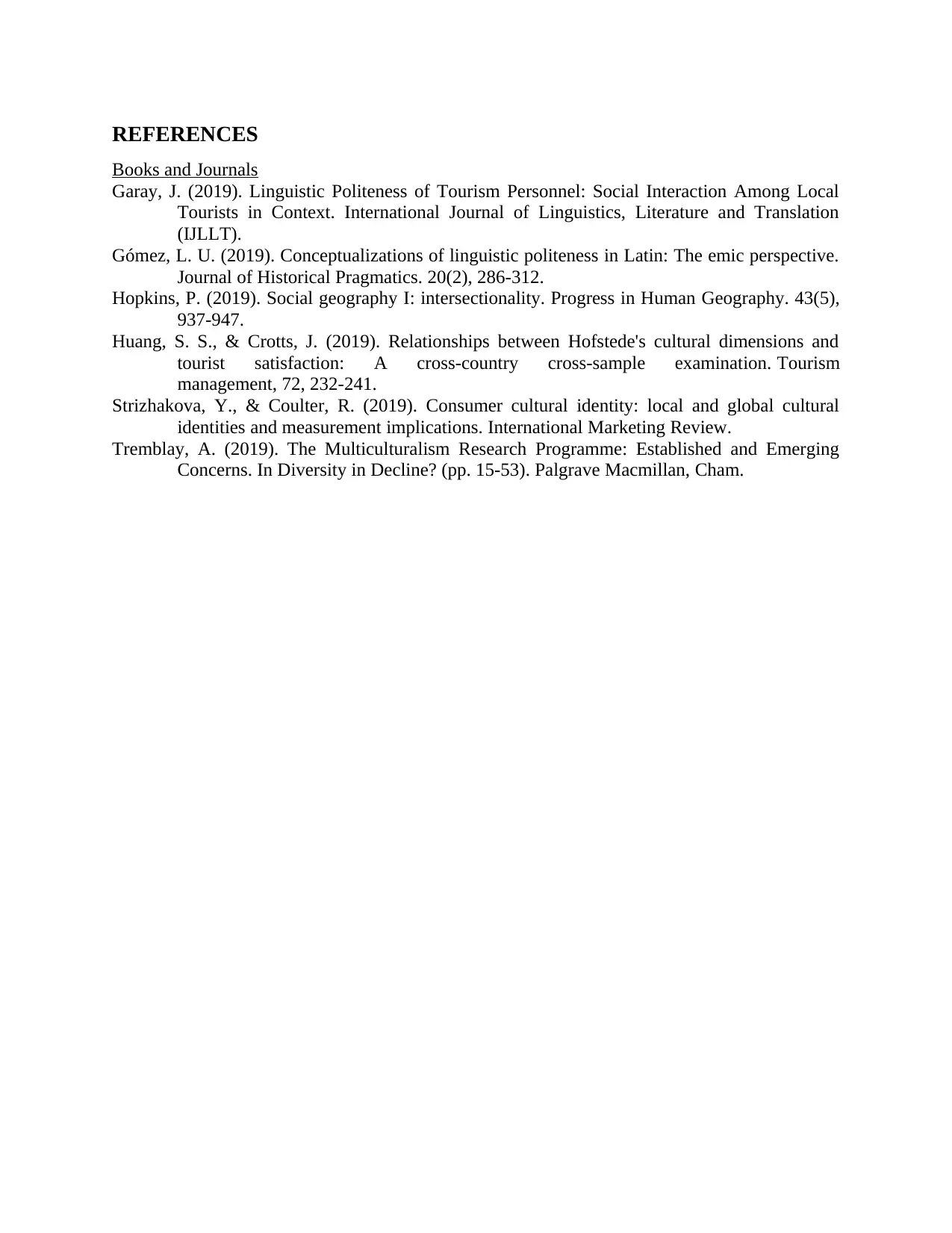
REFERENCES
Books and Journals
Garay, J. (2019). Linguistic Politeness of Tourism Personnel: Social Interaction Among Local
Tourists in Context. International Journal of Linguistics, Literature and Translation
(IJLLT).
Gómez, L. U. (2019). Conceptualizations of linguistic politeness in Latin: The emic perspective.
Journal of Historical Pragmatics. 20(2), 286-312.
Hopkins, P. (2019). Social geography I: intersectionality. Progress in Human Geography. 43(5),
937-947.
Huang, S. S., & Crotts, J. (2019). Relationships between Hofstede's cultural dimensions and
tourist satisfaction: A cross-country cross-sample examination. Tourism
management, 72, 232-241.
Strizhakova, Y., & Coulter, R. (2019). Consumer cultural identity: local and global cultural
identities and measurement implications. International Marketing Review.
Tremblay, A. (2019). The Multiculturalism Research Programme: Established and Emerging
Concerns. In Diversity in Decline? (pp. 15-53). Palgrave Macmillan, Cham.
Books and Journals
Garay, J. (2019). Linguistic Politeness of Tourism Personnel: Social Interaction Among Local
Tourists in Context. International Journal of Linguistics, Literature and Translation
(IJLLT).
Gómez, L. U. (2019). Conceptualizations of linguistic politeness in Latin: The emic perspective.
Journal of Historical Pragmatics. 20(2), 286-312.
Hopkins, P. (2019). Social geography I: intersectionality. Progress in Human Geography. 43(5),
937-947.
Huang, S. S., & Crotts, J. (2019). Relationships between Hofstede's cultural dimensions and
tourist satisfaction: A cross-country cross-sample examination. Tourism
management, 72, 232-241.
Strizhakova, Y., & Coulter, R. (2019). Consumer cultural identity: local and global cultural
identities and measurement implications. International Marketing Review.
Tremblay, A. (2019). The Multiculturalism Research Programme: Established and Emerging
Concerns. In Diversity in Decline? (pp. 15-53). Palgrave Macmillan, Cham.
1 out of 5
Related Documents
Your All-in-One AI-Powered Toolkit for Academic Success.
+13062052269
info@desklib.com
Available 24*7 on WhatsApp / Email
![[object Object]](/_next/static/media/star-bottom.7253800d.svg)
Unlock your academic potential
Copyright © 2020–2026 A2Z Services. All Rights Reserved. Developed and managed by ZUCOL.




